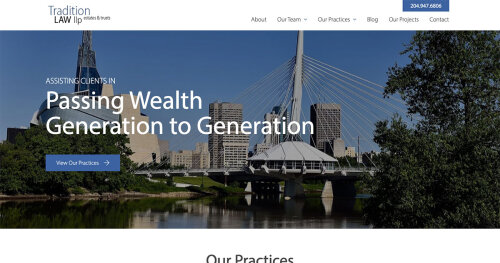Best Probate Lawyers in Winnipeg
Share your needs with us, get contacted by law firms.
Free. Takes 2 min.
List of the best lawyers in Winnipeg, Canada
About Probate Law in Winnipeg, Canada
Probate law in Winnipeg, Canada, involves the legal process by which a deceased person's will is validated and their estate is managed, administered, and distributed. This process is crucial to ensuring that the deceased's wishes are honored and that their debts are settled. The estate is typically administered according to the deceased’s will or, if there is no will, according to the laws of intestacy. The probate process also protects the rights of heirs and beneficiaries.
Why You May Need a Lawyer
There are several situations where legal expertise in probate may be necessary in Winnipeg. If a will is contested, if the estate is complex or includes businesses, if the deceased had significant debts, or if beneficiaries are located in different jurisdictions, a lawyer can provide essential guidance. Additionally, understanding tax implications and efficiently navigating legal paperwork and deadlines often requires professional assistance.
Local Laws Overview
The probate process in Winnipeg falls under the jurisdiction of the Court of King's Bench. Executors, or personal representatives, are responsible for managing the estate, often requiring a grant of probate to confirm their authority to act. The Wills Act and the Intestate Succession Act are key pieces of legislation that influence probate, especially if the deceased did not leave a valid will. Additionally, The Estate Administration Act outlines the responsibilities and rights of executors or administrators in managing an estate.
Frequently Asked Questions
What is probate?
Probate is the legal process that validates a will and allows for the administration and distribution of a deceased person's estate.
Do all estates go through probate in Winnipeg?
Not all estates require probate. Small estates or those with joint ownership and valid beneficiary designations typically avoid the probate process.
How long does the probate process take?
The duration varies, but the process can take several months to over a year, depending on the estate's complexity and any disputes involved.
Can a will be contested?
Yes, a will can be challenged on various grounds such as undue influence, lack of capacity or if it doesn't meet legal formalities.
What happens if there is no will?
If a person dies intestate (without a will), their estate is distributed according to the Intestate Succession Act, which may not align with what the deceased would have wanted.
What are the executor's responsibilities?
An executor administers the estate, which includes gathering assets, paying debts and taxes, and distributing the remaining assets to beneficiaries.
How are estate taxes handled?
Canada does not have an estate or inheritance tax, but taxes may be owed on the deceased's final tax return, and on income generated by the estate.
Do I need probate if I am the sole beneficiary?
Even if you are the sole beneficiary, probate may still be necessary if the estate includes assets that require formal transfer under a grant of probate.
How is an estate distributed without a will?
The estate is distributed based on provincial intestacy laws, often prioritizing the deceased's spouse and children.
What are the costs associated with probate?
Probate fees are based on the total value of the estate, alongside potential legal and administrative costs incurred during the process.
Additional Resources
For those seeking further assistance, resources like the Manitoba Bar Association, Community Legal Education Association (CLEA Manitoba), and Legal Aid Manitoba can be invaluable. Additionally, government resources such as the Province of Manitoba's Estate Planning & Administration guide provide helpful information.
Next Steps
If you require legal assistance regarding probate in Winnipeg, it is advisable to consult with a lawyer specializing in estates and wills. You should gather relevant documents, such as the will, death certificate, and any financial records of the deceased. Schedule a consultation to discuss your specific situation and receive professional guidance on managing the estate efficiently and lawfully.
Lawzana helps you find the best lawyers and law firms in Winnipeg through a curated and pre-screened list of qualified legal professionals. Our platform offers rankings and detailed profiles of attorneys and law firms, allowing you to compare based on practice areas, including Probate, experience, and client feedback.
Each profile includes a description of the firm's areas of practice, client reviews, team members and partners, year of establishment, spoken languages, office locations, contact information, social media presence, and any published articles or resources. Most firms on our platform speak English and are experienced in both local and international legal matters.
Get a quote from top-rated law firms in Winnipeg, Canada — quickly, securely, and without unnecessary hassle.
Disclaimer:
The information provided on this page is for general informational purposes only and does not constitute legal advice. While we strive to ensure the accuracy and relevance of the content, legal information may change over time, and interpretations of the law can vary. You should always consult with a qualified legal professional for advice specific to your situation.
We disclaim all liability for actions taken or not taken based on the content of this page. If you believe any information is incorrect or outdated, please contact us, and we will review and update it where appropriate.












